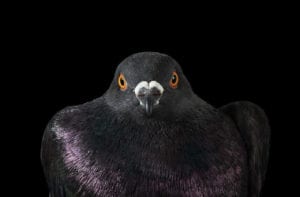Feral pigeons in Europe (Columba livia domestica), which thrive in most European towns and cities, are commonly infected with the zoonotic bacterium Chlamydophila psittaci, the agent of psittacosis (also known as ornithosis) in humans. A number of surveys carried out over the last thirty years across Europe have detected high seropositivity values and high percentages of infection in Europe feral pigeons populations. Overall, when considering data from 11 European countries, seropositivity values to C. psittaci in the sampled populations ranged from 19.4% to 95.6%. In most surveys, the complement fixation test was used, and antibodies were detected in 19.4-66.3% of the samples, with a median of 46.1%. Indirect immunofluorescence and ELISA tests were employed less frequently, but led to the detection of higher percentages of seropositivity (23.7-67.7% and 35.9-95.6%, respectively). Attempts to grow C. psittaci in cell culture or embryonated chicken eggs were successful in 2-42.3% and 0-57.1% of samples, respectively, antigen detection methods were positive in 2.3-40% of samples, while conventional PCR and real-time PCR using different genomic targets detected the organism in 3.4-50% of samples. Twenty-five C. psittaci isolates from pigeons were typed as ompA genotype B (n=14), E (n=10) and E/B (n=1). The huge increase of feral pigeon populations in Europe is a major cause of concern for the detrimental effect of pigeon droppings on environmental hygiene, in addition to the extensive damage due to the fouling of buildings and monuments. The most important pathogenic organism transmissible from feral pigeons to humans is C. psittaci, with 101 cases of disease reported in the literature. Exposure to C. psittaci-contaminated dust, direct contact with pigeons through handling and, to a lesser extent, through pigeon feeding have been identified as hazardous exposures in more than half of the human cases, while loose or transient contacts with Europe feral pigeons have been mentioned in about 40% of the cases.

Education initiatives as to the communication of a health risk resulting from contact with pigeons and pigeon excreta should primarily be targeted at individuals who may be exposed to C. psittaci-contaminated dust, such as demolition/construction workers. Recommendations to this category of workers include wearing protective clothes with hoods, boots, gloves and air filter face masks when removing pigeon faeces from roofs, garrets and buildings, especially if working indoors. Monitoring for C. psittaci infections in these workers over time should also be considered. Children should be warned not to handle sick or dead pigeons, and immunocompromised individuals should be advised to carefully limit their contact to feral pigeons. Culling of pigeons by shooting or poisoning is both unethical and ineffective as the place of the killed birds in the population is quickly filled by new juveniles or immigrating birds from neighbouring areas. Pigeon-deterring systems, such as nets and plastic or metal spikes applied to buildings and monuments will prevent their fouling, and the administration of contraceptive drugs may allow size regulation of the pigeon populations. Nevertheless, the measure that will ultimately lead to permanent reduction and will establish healthy sustainable populations is the restriction of indiscriminate feeding by pigeon lovers. The erection of dovecotes and artificial breeding facilities should be considered for providing shelter and a balanced diet to the birds, as well as a chance of interaction for pigeon lovers in a hygienically controlled environment.
At Pigeon Patrol, we manufacture and offer a variety of bird deterrents, ranging from Ultra-flex Bird Spikes with UV protection, Bird Netting, 4-S Gel and the best Ultrasonic and audible sound devices on the market today.
Contact us at 1- 877– 4– NO-BIRD, (604) 585-9279 or visit our website at www.pigeonpatrol.ca
Bird Gone, Pigeon Gone, Seagull Gone, Pigeon problems, pigeon spikes, 1-877-4NO-BIRD, 4-S Gel, Bird Control, Pigeon Control, bird repellent, Bird Spikes, sonic bird repellent, stainless steel bird spikes, bird spikes Vancouver, Ultra Sonic Bird Control, Bird Netting, Plastic Bird Spikes, Canada bird spike deterrents, Pigeon Pests, B Gone Pigeon, Pigeon Patrol, pest controller, pest control operator, pest control technician, Pigeon Control Products, humane pigeon spikes, pigeon deterrents, pigeon traps, Pigeon repellents, Sound & Laser Deterrents, wildlife control, raccoon, skunk, squirrel deterrent, De-Fence Spikes, Dragons Den, Canada bird spikes, Canada pigeon, pigeon control, pidgon patrol, pidgon. Kill pigeons, crow, starling
